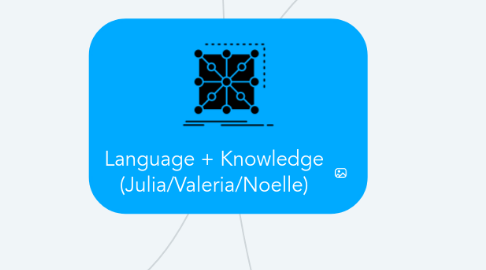
1. Methods & Tools (Valeria)
1.1. Language = organises internal thoughts Language as a tool not to communicate but to internalise thoughts
1.1.1. Language = articulates knowledge knowledge as a tool - for articulating language
1.1.1.1. Eg: Metaphors used to add more meaning to a word by relating it to something (“eyes are the windows to the soul)
1.1.1.1.1. - Make things more clear + relatable to reader (used in natural sciences to make technical language more understandable)
1.2. Critisms of language: Language encourages classification. Through this classification - we can relate it back to acquisition of knowledge. language is liked to things like stereotypes:
1.2.1. Eg: of when language was used to classify systems which resulted in negative consequences.
1.2.1.1. - Homosexuality was listed as a mental disorder, this created the false belief that homosexuals were “sick” and could be “cured”
1.2.2. Because of this language often reveals biases
2. Scope (Julia)
2.1. What are the key current open/unanswered questions in these themes/areas of knowledge?
2.1.1. If you know fewer words, do you think fewer thoughts?
2.1.2. What are all the forms of language?
2.1.3. Do animals have language?
2.1.4. Can all knowledge be expressed in words and symbols?
2.1.5. What percent of knowledge is gained via language?
2.2. What makes this theme/area of knowledge important?
2.2.1. Language influences how we think is certain contexts, = an effect on the knowledge we create
2.2.2. All knowledge is communicated through language, its important to reflect on the roles language plays.
2.2.2.1. Language has the ability of controlling the truth
2.3. Experimental knowledge motivates people to learn more and feel the significance of what one has come to know = results in further motivation to gain other forms
2.3.1. Knowing from direct personal experience can influence the difficulty of expressing it through words
2.3.1.1. Varies discipline to discipline and culture to culture
2.4. What practical problems can be solved through the application of knowledge from these themes/ areas of knowledge?
2.4.1. Language can persuade and influence people's emotions
2.4.1.1. eg. receiving prep-game of halftime prep talk from a coach can arose emotions therefore we can use language to our own advantage
3. Ethics
3.1. Negative aspects of language:
3.1.1. - How words can be manipulated to sound a certain way (deceiving the listener)
3.1.1.1. - Eg: Mike Pence saying “enhanced interrogation techniques” was used instead of torture
3.1.1.1.1. - The use of language in politics is used to redirect meanings and make sound more morally correct.
3.1.1.2. euphemism
3.1.2. - language used to spread hate speech.
3.1.2.1. eg: Racist and discriminatory terms.
3.2. both positive and negative aspects
3.2.1. - Language used to influence people emotionally
3.2.1.1. Eg: inspirational speeches
3.2.1.1.1. links to emotions / cultures
3.2.1.1.2. speeches concerning climate change, use of language used for people to be emotionally affected take action
3.2.1.2. Eg: Marketing firms and advertisements.
4. Perspectives (Noelle)
4.1. What do these themes/areas of knowledge identify about knowledge that is rooted in particular social and cultural groups?
4.1.1. Perspective influences the interaction between knowledge and language
4.1.1.1. It can limit or broaden knowledge of specific cultural or social groups
4.1.1.2. Linguistic Relativism
4.1.1.2.1. the way people feel about a concept may way
4.1.2. Language can also be thought of being created, as knowledge is gained
4.1.2.1. For example, when discovering planets or photosynthesis, we use language to describe those concepts.
4.2. Are some types of knowledge less open to interpretation than others?
4.2.1. Tacit knowledge is more up to interpretation = ambiguity
4.2.1.1. strength of language, describe an action more accurately, affected by perspectives
4.2.1.1.1. e.g. strut, float, stroll, tramp - these synonyms convey a different feeling
4.2.1.2. However, it can be seen as a weakness, as it may create 'psychological discomfort'.
4.2.1.2.1. e.g. for LGBTQ community and their preferred gender pronouns
4.3. Is an understanding of the perspective of other knowers essential in the pursuit of knowledge?
4.3.1. language used to pass knowledge between each other
4.3.2. be aware of their perspective to gain reliable and accurate knowledge
4.3.2.1. be aware of people with a different native language to understand their reasoning
4.3.2.1.1. eg, a spanish speaker has to understand that a german speakers may have a different perception of a 'bridge' (different gender pronoun)
4.4. What is the significance of key historical developments within these themes/areas of knowledge?
4.4.1. Words have emerged from cultural values
4.4.2. languages evolved with cultures, historical events and experiences of a community
4.4.2.1. societies are hierarchical --> part of society with powerless fell oppressed.
4.4.2.2. influences experience of a community --> affect language evolved
